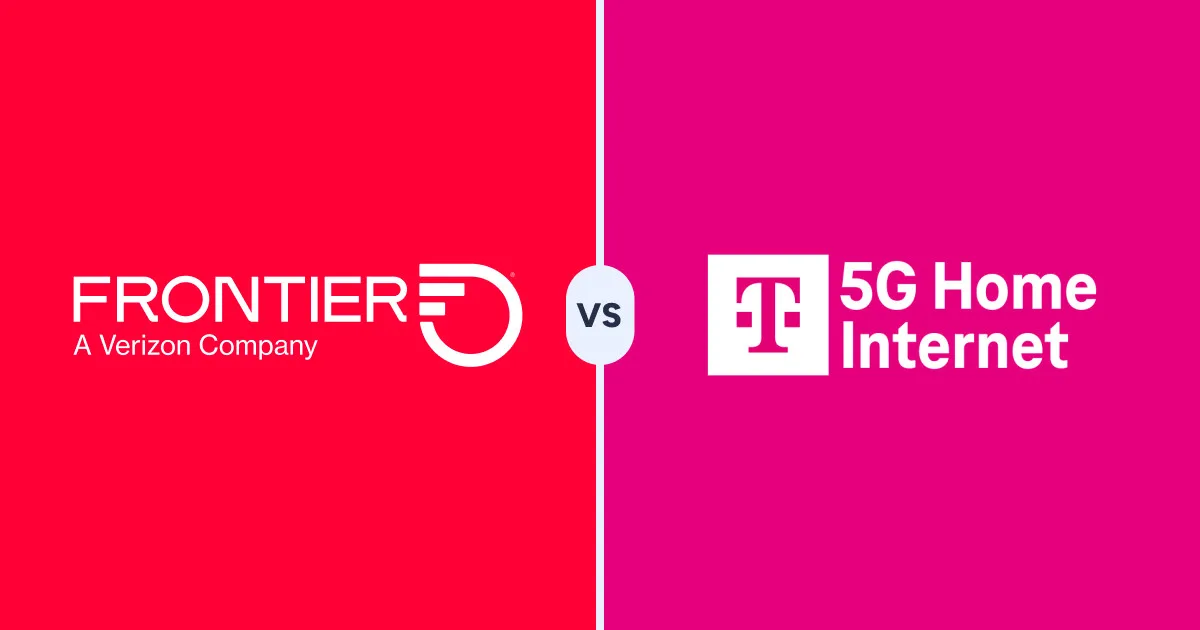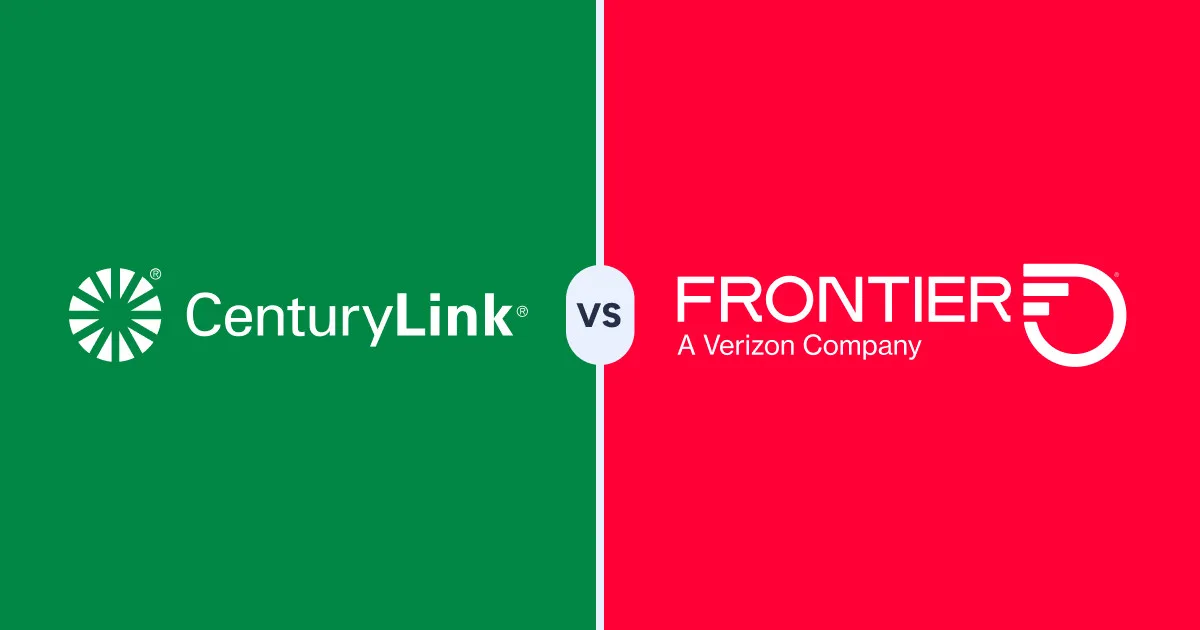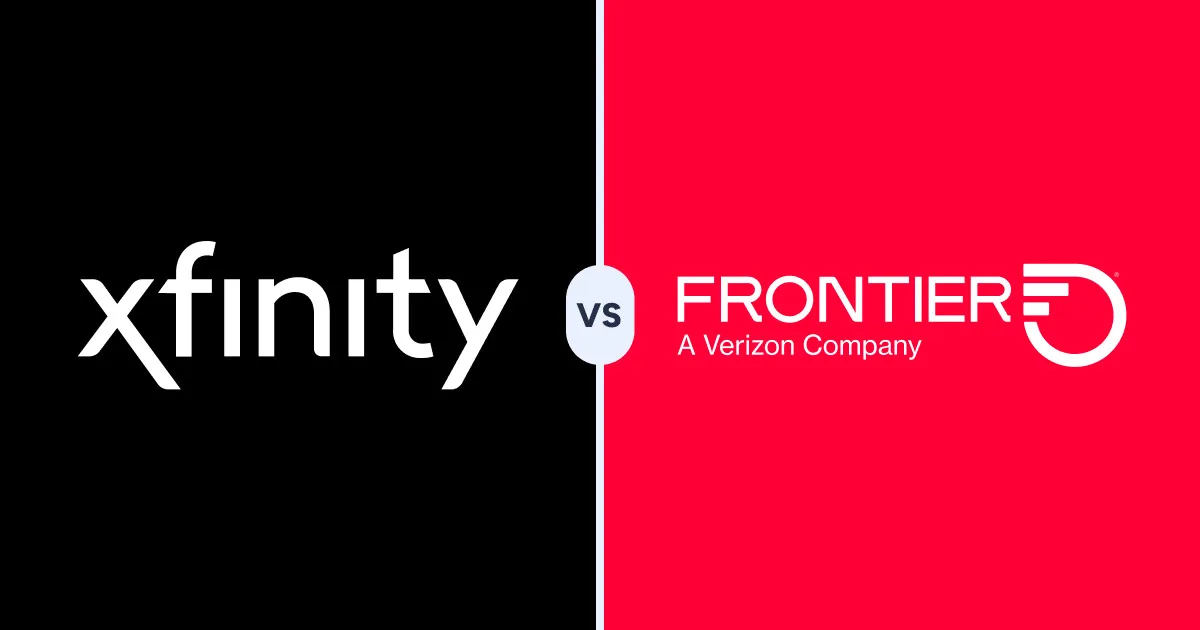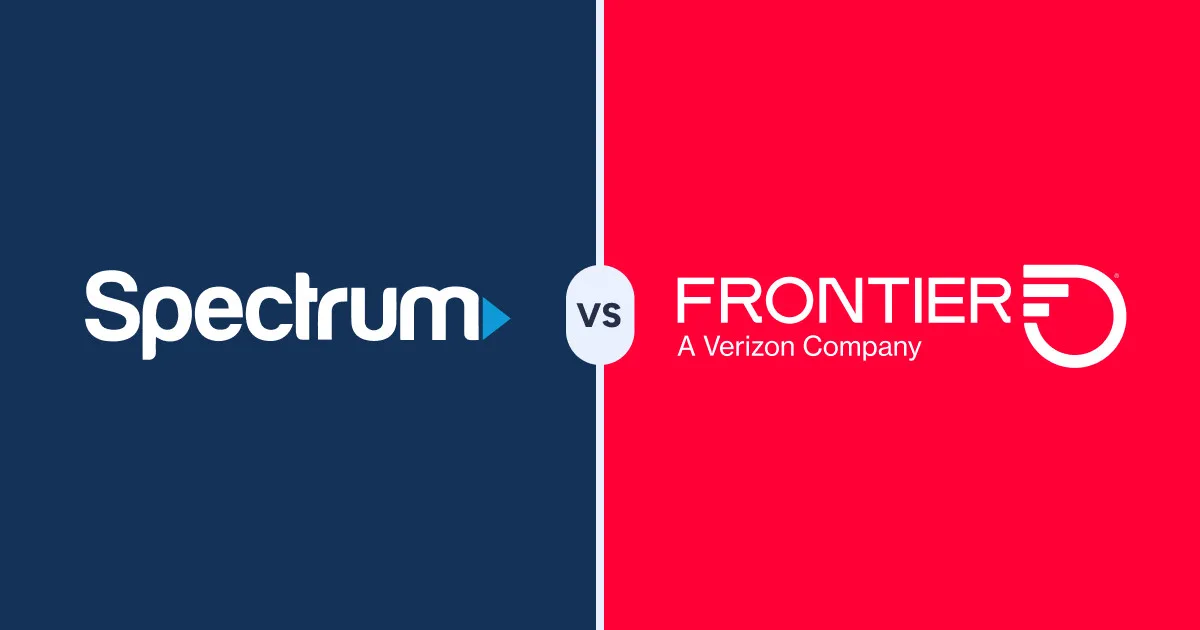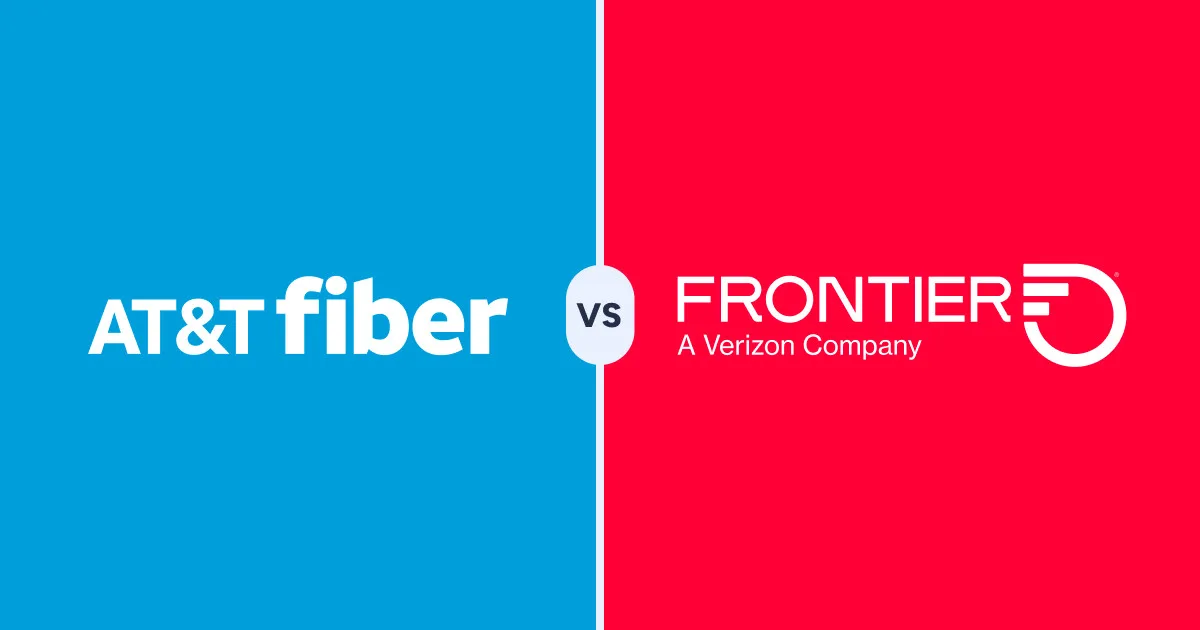Verizon vs. Cox
Fantastic fiber versus competent cable—two internet giants go head to head.
Jan 13, 2026 | Share
Provider Comparisons (Versus)
-
Best fiber performance
- Customer rating: 3.9
- Price: $49.99–$109.00/mo.* w/ Auto Pay
- Speed: 300–2,048Mbps
- Internet type: Fiber, DSL
- Data cap: None
- Contract: Month to month
-
Best for availability
- Customer rating: 3.7
- Price: $55–$115/mo.
for 24 mos. - Speed: 300–2,000Mbps
- Internet type: Cable
- Data cap: 1.2 TB
- Contract: Annual (month-to-month options available)
Read disclaimers.
Compare Verizon and Cox head to head
You really can’t beat Verizon. The fiber provider offers extremely fast internet service at an extremely fair price—our only qualm is Verizon’s limited availability. Cox has much better availability throughout the US and respectable customer service ratings, but it will also hit you with higher price hikes and annoying extra fees.
Pros and cons: Verizon vs. Cox
 Pros:
Pros:
- Fast upload speeds
- No data caps or annual contracts
- Affordable prices on most fiber plans
 Cons:
Cons:
- Limited availability
 Pros:
Pros:
- Wide availability
- Excellent customer service ratings
- Solid bundle deals
 Cons:
Cons:
- High price hikes
- Data caps on all plans
Want to know if Verizon or Cox are in your area? Take a look by typing in your zip code below.
Jump to: Plans and pricing | Deals and promotions | Extra fees | Customer ratings | Bundles | Internet types | Data caps | Contracts | Installation | Availability
Jump to:
Plans and pricing: Verizon vs. Cox
Verizon offers a handful of fiber internet plans that all deliver superior speeds at affordable prices—you need only decide how deluxe you want to get, since you’ll get excellent service no matter what. Cox offers a more standard set of cable internet options, starting at plans that are slow but cheap and culminating in a top-shelf gigabit plan.
Verizon plans and pricing
| Package | Price† | Speed |
|---|---|---|
| Fios 300 Mbps | $49.99/mo. w/ Auto Pay | 300 Mbps/300 Mbps |
| Fios 500 Mbps | $74.99/mo. w/ Auto Pay | 500 Mbps/500 Mbps |
| Fios 1 Gig | $89.99/mo. w/ Auto Pay | Up to 940 Mbps/up to 880 Mbps |
| Fios 2 Gig | $109.00/mo. w/ Auto Pay | Up to 2,048 Mbps/up to 2,048 Mbps |
| 5G Home | $50/mo. w/ Auto Pay | Up to 300 Mbps |
| 5G Home with select 5G mobile plans | $35/mo. w/ Auto Pay | Up to 300 Mbps |
| 5G Home Plus | $60/mo. w/ Auto Pay | Up to 500 Mbps |
| 5G Home Plus with select 5G mobile plans | $45/mo. w/ Auto Pay | Up to 500 Mbps |
| 5G Home Ultimate | $75/mo. w/ Auto Pay | Up to 1,000 Mbps |
| 5G Home Ultimate with select 5G mobile plans | $60/mo. w/ Auto Pay | Up to 1,000 Mbps |
| LTE Home | $60/mo. w/ Auto Pay | Up to 50 Mbps |
| LTE Home Plus | $80/mo. w/ Auto Pay | Up to 50 Mbps |
† Consumer data usage is subject to the usage restrictions set forth in Verizon’s terms of service; visit: https://www.verizon.com/support/customer-agreement/ for more information about 5G Home and LTE Home Internet or https://www.verizon.com/about/terms-conditions/verizon-customer-agreement for Fios internet.
Verizon gives you more bang for your buck than Cox. Its slowest offered speed is 300Mbps and while that plan costs the same as Cox’s 300Mbps plan initially, Cox increases prices after a 24 month promo period. All of Verizon’s plans also come with unlimited data and don’t require an annual contract, unlike Cox’s.
Most internet users will be very content with 300Mbps download and upload speeds, and Verizon’s 300Mbps plan comes at an extremely fair price—it’s really the best option of the bunch here. But we recommend one of Verizon’s faster plans if you live in a larger household and spend a lot of time doing bandwidth-heavy stuff like streaming video in 4K or hosting livestreams.
How much speed do you have?
Download our speed test app to see what kind of Wi-Fi firepower you have with your current home internet network. If it isn’t fast enough for you, then consider upping your Mbps to a better speed.
How much speed do you have?
Run a speed test to see what kind of Wi-Fi firepower you have with your current home internet network. If it isn’t fast enough for you, then consider upping your Mbps to a better speed.
Cox plans and pricing
| Package | Price | Speed |
|---|---|---|
| Fast | $55/mo.* for 24 mos. | Up to 300Mbps |
| Go Even Faster | $85/mo.* for 24 mos. | Up to 500Mbps |
| Go Super Fast | $100/mo.* for 24 mos. | Up to 1,000Mbps |
| Go Beyond Fast | $115/mo.* for 24 mos. | Up to 2,000Mbps |
*Excludes taxes and fees. No annual contract. For 24 mos.
Cox won’t wow you on speed or price in the same way that Verizon does, but you can still get a solid internet setup for a fair deal. Its offerings are pretty much in line with what you can get from most cable internet providers, with lots of options to choose from and exponentially higher prices for faster speeds.
Unlike Verizon, Cox has annual contracts (which you can avoid by paying $10 more on your bill every month) and data caps (albeit fairly generous ones of 1.2 TB per month). Cox also has steep price hikes that hit 24 months after you sign up for service—depending on your plan, expect your bill to go up anywhere from $15 to $26 per month. Definitely check the fine print before signing up.
One additional plan we find intriguing is Cox’s StraightUp Internet. Billed as a kind of no-frills budget option, it gives you 50 Mbps speeds at a flat fee, with equipment and installation included. You don’t have to deal with a term agreement or credit check. Except for the relatively slow speed, we love this plan—if only all of Cox’s offerings worked the same way!
Cox low-cost internet plans
Cox has two great low-cost internet plans for individuals and families receiving government assistance:
ConnectAssist package : up to 100 Mbps for individuals receiving government assistance.
Connect2Compete package : up to 100 Mbps for families with children K-12 receiving government assistance.

Deals and promotions: Verizon vs. Cox
- Choose between a 43-inch Samsung TV and a free Apple One perk for six months, $15 off per month for three years, or a Samsung Galaxy Tab S10 when you order Verizon Fios 1 Gig or 2 Gig by April 1
- Get $15 off home internet every month when you bundle with Verizon MyPlan
- Get six months of Apple One included with a new 5G Home Ultimate Plan from Verizon when you order between Feb. 5 and April 1
- Get a price lock guarantee for up to five years and unlimited data when you combine an unlimited mobile line with select internet speeds
- Get a gift card worth $125 when you refer a friend to Cox and earn up to $600 per year
- Veterans and community servants with GovX eligibility can get a gift card worth up to $200 with certain Cox home internet plans
Extra fees: Verizon vs. Cox
| Equipment Fee | Installation Fee | Other Fees | |
|---|---|---|---|
| Verizon | No charge for ONT (fiber modem), routers start at $18 per month. | $99.00 (waived if you order online) | 1.5% of the owed balance or $5 (late fee) |
| Cox | $13.00/mo. (Panoramic Wi-Fi) | $100 for professional installation; no cost for self-install | $10.00/mo. (early termination), $10.00 per 50 GB of data over your data cap, $10.00 (late payment), $75.00 trouble call service charge if not covered with Cox Complete Care |
Data as of 03/02/2023. Offers and availability may vary by location and are subject to change.
Verizon and Cox both have fairly standard extra fees for things like late charges. Verizon includes the ONT (fiber modem) in the plan price but charges $18 per month for a rental router. Cox lets you rent a modem and router (combined into one piece of equipment known as a gateway) to get your Wi-Fi connection going. Or you can use your own modem and router to avoid paying rental fees.
Both Verizon and Cox also charge for installation—but there are ways to avoid paying for it. With Verizon, simply order online and the $99 installation fee will be waived. In Cox’s case, opt for self-installation instead of professional installation and you can get a self-install kit to set everything up yourself for free.
Want to know if you can get Verizon and Cox in your area? Find out by searching your zip code below.
Should you rent a router or buy one?
If you think you’ll have the same internet service for at least two years, we recommend buying your own router or gateway instead of renting one from the provider. Doing so saves you money in the long run and also gives you more flexibility about the type of equipment you can use. But the details look a little different for each of these ISPs.
Since Verizon is a fiber service, you can’t purchase your own ONT, which serves a function similar to a modem. Verizon provides the ONT free of charge, but the ONT doesn’t emit a Wi-Fi signal; for that, you’ll need a router. Verizon offers router rentals starting at $18 per month, which is pretty expensive compared to other ISPs. We admit that the router Verizon provides is top-notch, but whether you’ll appreciate its advanced capabilities and features is another matter. Most customers are probably better off purchasing their own router.
Cox’s situation is more straightforward. You can either rent a Cox gateway (modem/router combo) or buy your own. Purchasing your own gateway will save you money if you stick with the service for more than a few years. But keep in mind, renting does add a layer of convenience: if anything goes wrong with a rental router, the ISP will fix it.
We’ve got all the details on the best Wi-Fi routers, the best long-range routers, and the best routers for streaming. But if you really want to know the best router to get of them all, we say go for Google Nest Wi-Fi. This two-band mesh router delivers excellent speeds over a range of up to 2,200 square feet.
Data as of 1/5/2022. Offers and availability may vary by location and are subject to change.
Amazon.com Price (as of 1/6/22 10:15 MST). See full disclaimer.
Customer ratings: Verizon vs. Cox
| Overall | Speed | Price | Reliability | Customer service | |
|---|---|---|---|---|---|
| Verizon | 3.9/5.0 | 4.0/5.0 | 3.6/5.0 | 4.0/5.0 | 3.9/5.0 |
| Cox | 3.7/5.0 | 3.9/5.0 | 3.4/5.0 | 3.7/5.0 | 3.8/5.0 |
Verizon gets better ratings than Cox in our annual customer satisfaction survey. But Cox does great in the survey as well.
Verizon’s scores are top-notch across the board, but customers say especially great things about Verizon’s reliability and speed: the fiber and 5G provider ranked first in both categories.
Although Cox lags behind Verizon in the survey, it still gets above-average rankings for speed and customer service. Cox consistently ranks in the top half for all other categories as well.
Best TV and internet combos
| Internet speed | TV channels | Price | Details | |
|---|---|---|---|---|
| 500 Mbps Internet + Your Fios TV | Up to 500Mbps | 125+ | $179.99/mo. combined w/ Auto Pay | View Plans |
| 300 Mbps Internet + YouTube TV | Up to 300Mbps | 100+ | $172.98/mo. combined w/ Auto Pay | View Plans |
| Cox Go Even Faster + Contour TV Preferred | 500Mbps | 75+ | $131.00/mo.† for 24 mos. | View Plans |
| Cox Go Even Faster + Contour TV Starter | 500Mbps | 140+ | $185.00/mo.† for 24 mos. | View Plans |
| Go Even Faster + Contour TV Ultimate | 500Mbps | 250+ | $222.00/mo.† for 24 mos. | View Plans |
†Prices include applicable monthly recurring service fees and applicable discounts. Excludes charges for existing Cox services. Additional one-time charges, activation fees and monthly equipment fees may apply. Prices do not include applicable taxes, usage-based charges, fees, and surcharges, which are subject to change. Prorated charges may appear on your bill if you change services before the bill cycle is complete.
Cox has a ton of package options to choose from, with its highest-tier Contour TV plan giving you access to 250 channels. And while Cox is a cable TV provider, it also offers up-to-date digital features like cloud DVR and access to Netflix. The obvious downside is that Cox’s bundles are quite expensive compared to Verizon.
Verizon doesn’t offer a traditional discount when pairing services. Instead, you can add TV, streaming services, and other perks to your internet service at any time. Verizon’s list of perks includes a Walmart+ membership (with Paramount+), Unlimited Cloud Storage, and more.
Internet types: Verizon vs. Cox
| Internet type | Details | |
|---|---|---|
| Verizon | Fiber | View Plans |
| Cox | Cable | View Plans |
Verizon offers fiber internet, while Cox specializes in cable internet. Fiber runs over fiber-optic wiring, using light signals to deliver an incredibly fast and reliable internet connection. It can deliver max speeds of up to 2,000 Mbps and is the only type of internet capable of delivering symmetrical upload and download speeds.
Cable internet runs on the type of coaxial cabling normally reserved for cable TV. It’s slower than fiber, but it still delivers consistent speeds of up to 1,000 Mbps. Cable internet is also much more widely available than fiber, making it the most common option for high-speed internet among American Wi-Fi customers.
Data caps: Verizon vs. Cox
| Data Cap | Overage fee | Details | |
|---|---|---|---|
| Verizon | None* | N/A | View Plans |
Cox| 1.25 TB/mo. | $10 per 50 GB | View Plans | |
* Consumer data usage is subject to the usage restrictions set forth in Verizon’s terms of service; visit: https://www.verizon.com/support/customer-agreement/ for more information about 5G Home and LTE Home Internet or https://www.verizon.com/about/terms-conditions/verizon-customer-agreement for Fios internet.
Verizon doesn’t have data caps on its internet plans. You can use as much data as you want all month long without having to pay any extra fees or experience internet slowdowns.
By comparison, Cox imposes a 1.25 TB data cap on all of its internet plans. While we’re not thrilled about any data cap, 1.25 TB is a lot of data—more than enough for most internet users. But if you exceed your cap, a $10 fee will be automatically added to your bill for every additional 50 GB you use.
Contracts: Verizon vs. Cox
| Contract length | Details | |
|---|---|---|
| Verizon | Month to month | View Plans |
| Cox | 1 yr., month-to-month option for $10/mo. extra | View Plans |
Verizon doesn’t do annual contracts. You don’t need to agree to any term limits up front, and you can quit any time without facing early termination fees.
Not so with Cox, which imposes annual contracts on all its plans. You can opt out of a contract by paying $10 more per month for your plan. If you have a yearly commitment and you need to cancel before the 12 months is up, you’ll need to fork over $10 for every month left on your bill—so either way, you’re paying more if you want to leave. Go with the contract option if you think you’ll be on Cox for at least a year.
Installation: Verizon vs. Cox
| Installation options | Details | |
|---|---|---|
| Verizon | $99.00 (waived when you order online) | View Plans |
| Cox | $100 for professional install; free for self-install kit | View Plans |
Verizon charges $99 for professional installation, but you can get the cost waived by ordering online. Cox will ask for $100 if you need a professional technician to come by and set up your internet. But installing the internet yourself with one of Cox’s self-install kits is free.
Availability: Verizon vs. Cox
Verizon has a relatively small footprint—its Fios internet services are available in 10 states (mostly on the East Coast), including New York, New Jersey, and Pennsylvania. Cox has a larger reach overall with availability in 29 states across the East Coast, West Coast, and South.
You can find out which providers operate in your area by searching your zip code below:
Final call: Verizon vs. Cox
You just can’t top Verizon in this contest. Any one of its fiber-optic plans will give you superb speeds at a reasonable price, and you won’t have to deal with data caps or contracts, either.
Cox’s offerings come with some extra baggage, including steep price hikes after a year. But it has much wider availability than Verizon and offers some solid, lower-priced plans and bundle deals. And you can’t beat Cox’s customer service, which gets excellent ratings in our latest customer satisfaction survey.
Methodology
Our HighSpeedInternet.com editorial team bases our analyses on customer input from our annual customer satisfaction survey, results from our speed test tool, and proprietary internet provider data on speeds and pricing. To strengthen our research, we look closely at provider contracts to get hard-to-find information on price hikes, data caps, and extra fees, and we keep tabs on the latest news reports and online reviews. When applicable, we also rely on our personal experiences testing these services.
More about Verizon and Cox
Disclaimers
*Verizon
- Price per month without select 5G mobile plans. Consumer data usage is subject to the usage restrictions set forth in Verizon’s terms of service; visit: https://www.verizon.com/support/customer-agreement/ for more information about 5G Home and LTE Home Internet or https://www.verizon.com/about/terms-conditions/verizon-customer-agreement for Fios internet.
- Available in select areas only. Price per month without select 5G mobile plans. Consumer data usage is subject to the usage restrictions set forth in Verizon’s terms of service; visit: https://www.verizon.com/support/customer-agreement/ for more information about 5G Home and LTE Home Internet or https://www.verizon.com/about/terms-conditions/verizon-customer-agreement for Fios internet.
Product prices and availability are accurate as of the date/time indicated and are subject to change. Any price and availability information displayed on Amazon.com at the time of purchase will apply to the purchase of this product. HighSpeedInternet.com utilizes paid Amazon links.
CERTAIN CONTENT THAT APPEARS ON THIS SITE COMES FROM AMAZON. THIS CONTENT IS PROVIDED ‘AS IS’ AND IS SUBJECT TO CHANGE OR REMOVAL AT ANY TIME.
Author - Peter Holslin
Peter Holslin has more than a decade of experience working as a writer and freelance journalist. He graduated with a BA in liberal arts and journalism from New York City’s The New School University in 2008 and went on to contribute to publications like Rolling Stone, VICE, BuzzFeed, and countless others. At HighSpeedInternet.com, he focuses on covering 5G, nerding out about frequency bands and virtual RAN, and producing reviews on emerging services like 5G home internet. He also writes about internet providers and packages, hotspots, VPNs, and Wi-Fi troubleshooting.
Editor - Rebecca Lee Armstrong
Rebecca Lee Armstrong has more than six years of experience writing about tech and the internet, with a specialty in hands-on testing. She started writing tech product and service reviews while finishing her BFA in creative writing at the University of Evansville and has found her niche writing about home networking, routers, and internet access at HighSpeedInternet.com. Her work has also been featured on Top Ten Reviews, MacSources, Windows Central, Android Central, Best Company, TechnoFAQ, and iMore.



